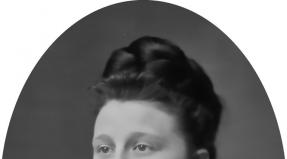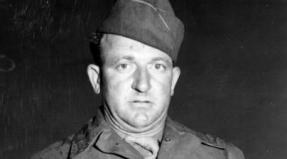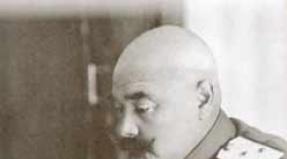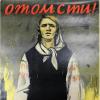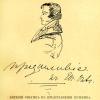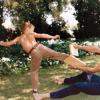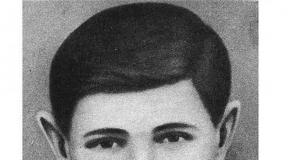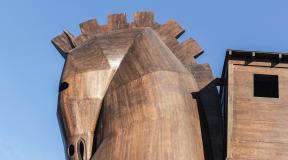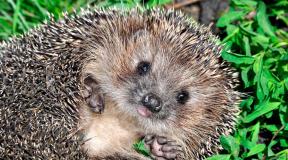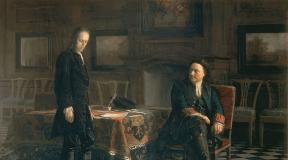Anton Ulrich Braunschweig brief biography. Emperor Ivan Antonovich Braunschweigsky and their family. Marriage with Anna Leopoldovna
One of the most tragic figures in Russian history was the young Emperor Ivan Antonovich Braunschweigsky, formally held the throne from October 17, 1740 to November 25, 1741. He was born on August 12, 1740 in the family of Anna Leopoldovna, the native niece of Empress Anna John, and Prince Anton Ulrich Braunschweigsky and died on July 5, 1764 in the Khlleshelburg fortress, where he was in custody. John Antonovich became the emperor under the ban. He and his family were sacrificed to what was customary to be called the well-being of the state, as well as the tranquility of those persons who stood in power throughout the life of the unfortunate emperor.
Peter the Great took continuous attempts to introduce Russia into a large European policy, not limited to only economic and military funds, he began to fix the filament of the political interests of the state by the bonds of dynastic marriages connecting the Romanovs with the houses of foreign rulers from Western Europe. The consequence of such a policy was the marriage union of his older brother Ekaterina Ivanovna and the Duke of Mecklenburg Karl Leopold, concluded in 1716. The fruit of this marriage was the birth of July 7/8, 1718 in the Greytoe girl, which was dubbed in Lutheran's custom and called Elizabeth Catherine Christine. The marriage turned out to be unsuccessful, and in the summer of 1722, Ekaterina Ivanovna at the invitation of his mother Praskovya Fedorovna arrived in Russia and did not return to her husband.
In 1730, the imperial throne took the childless Anna John, the native aunt Elizabeth Ekaterina Christine. From now on, a small princess began to look at the possible heiress of the Empress. The princess remained while in Lutheran religion and officially did not change the name, but they began to call Anna. Anna Ioannovna itself no certain intentions at the expense of the niece originally did not express initially, but in 1731 confirmed the right of the monarch declared by Peter I to appoint the heir to the throne in his will.

IG Vekhind. Portrait of Anna Leopoldovna
Later there was a draft vice-chancellor Andrei Ivanovich Osterman and Ober-Stall Macesister Karl Gustav Levvenavold, according to which Anna should have given out for one of the foreign princes, and her child for choosing the empress and independently of the birthright will inherit the throne. So Levvenavold was sent to Germany to find an acceptable candidate of the groom. He fulfilled the mission and chose two candidates - Prince Charles Brandenburg-Bayreit and Prince Anton Ulrich Braunschweig-Bevernsky. Anna Ioannovna decided to stop his choice but the second and invite Anton Ulrich to appoint it to the Colonel of the Kirassius regiment, determining the money content.

IG Vekhind. Portrait of Anton Ulrich (?)
Anton Ulrich was born on August 28, 1714 in the Duke of Braunschweig-Bevernsky Ferdinand Albrecht II and his wife Antoinette Amalia. He was the second son, the families of the family were small, so the trip to Russia and the possibility of marriage on the nephew of the Empress were perceived as a smile of fortune. The official reason for the trip was the receipt of the Russian military service. In St. Petersburg, the prince arrived on February 3/14, 1733. For the residence of Anton Ulrich was prepared located near the royal palace Chernyshev. Empress, Duchess Mecklenburg Ekaterina Ivanovna and even Elizabeth herself Ekaterina Christine accepted him quite favorably. The prince studied the Russian language and the other necessary sciences, one of his teachers is called the poet of Trediakovsky. Soon he switched to Orthodoxy. But the case with marriage for various reasons was not laid. Yes, and the alleged bride itself did not feed to Anton Ulrich delicate feelings and in 1735 he was fascinated by the Saxon Messenger by the Graph Moritz Linar. In order to avoid a major scandal, the empress sent an educator of Princess Madame D'Fader, patronized by this hobby. Linar was also withdrawn from St. Petersburg.
In 1737, the Prince went to his first military campaign against the Turks as a simple volunteer under the command of Field Marshal Miniha. In his report on the session of the minih, he wrote that Anton Ulrich showed uncomfortable courage and was in the very center of battle. After that, the prince entrusted the reputation of a fearless warrior. In 1738, the Empress complained to him the Higher Order of the Empire - the Order of St. Andrew the First-Called, he was also produced in the Premier Majors of the Guards Semenovsky Regiment. In the same year, the prince went to a new campaign, and in his retinue was driving the famous Karl Jeronimus von Münhgausen. The prince again participated in battles, and in a battle near the river Billoch, his shelves covered the right flank of Russian artillery, who did not have time to take a combat position.
However, Princess Anna remained cold to Anton Ulrich, and did not go with marriage. The impetus to the junction gave an attempt to be a favorite of the Empress of Biron to marry on Anna his eldest son of Peter, who, besides, was younger.

The princess insulted by refusal, Biron convinced Anna Johnnun to finally resolve the case with marriage Anton Ulrich. Began cooking for the wedding. On July 2, 1739, engaged in the high hall of the Winter Palace. The next day, a wedding rite took place in the Kazan Church. The festivities continued for a week, all the days and evenings of which were filled with banquets, salutes, illuminations, balas, masquerades.
Anna Leopoldovna did not immediately be able to become pregnant, which caused the displeasure to the empress, inflamed by Biron. For a while, all time has switched to the Holstein Prince Charles Peter, the native grandson of Peter I, the son of his daughter Anna. However, on August 12, 1740, Anna Leopoldovna gave birth to such a long-awaited son, named after Praded Ivan.
At the same time, more and more rumors about the disadvantage between the young spouses, as well as the serious illness of the Empress appeared. Anna Ioannovna immediately published a manifesto, which called the heir to the throne of John Antonovich, and, in the case of his death, any other, elderly, the prince born in the family of Anna Leopoldovna and Anton Ulrich. This manifesto played a tragic role in the fate of other children in the Braunschweig family, making them rivals to those who occupied the throne. Practically, the bed of the dying empress was played by the struggle on the regency at the Minor Emperor. Among the possible candidates were called Anton Ulrich, but the Empress decided the case in favor of his beloved Biron.
Regent identified Anton Ulrich and Anna Leopoldovna Money content in 200,000 rubles per year, but Prince Brownshweigsky himself wanted to be the ruler with his son. The biron came rumors about the conspiracy, whose head of John Antonovich could become the head. A conversation took place between Biron and Prince and Princess, during which the regent threatened to send the whole family from Russia, and Anna Leopoldovna was forced to be forgiven for himself and his spouse. Before the expulsion, the case did not reach, but all the approximate Prince were arrested, Anton Ulrich himself was called to explain to the convened assembly of senators, ministers and generals, and the interrogation was led by Ushakov, where the prince confessed to the attempt to shift the Biron, and was also forced to refuse All military ranks.

Portrait of Anton-Ulrich (?) Brushes of an unknown artist
However, Biron was displaced, and made it Feldmarshal Count Bukhard Christopher Minih, his long-standing opponent. The coup took place on the night from 7 to 8 November 1740, the regent with his whole family was sent to the reference in the sang. The government with a small emperor was proclaimed Anna Leopoldovna, and Anton Ulrich received the rank of Generalissimus of the Russian Army. All persons who contributed to and sympathizing a coup were generously rewarded.
The Board of Anna Leopoldovna can not be called successful. From the very first days, quarrels broke out between the rival borements. There was practically no concern for the baby-emperor, although all the decrees were published on his behalf. The minih was not satisfied and sought to focus in his hands all the power.
There was no consent between the spouses, especially since Larnar arrived at the yard again, And Anna Leopoldovna was going to marry him on his beloved Freilline Julian Mengden to bind to the Russian court forever. On April 14, 1741, the minih received a resignation, and the Empire's affairs switched to Osterman, as they were not interested in the government. Her close and constant surroundings were cute, but absolutely useless in the affairs of the board, people: Juliana Mengden, Minister of Vienna Botta D'Aadorno, Ober-Gofmeister Ernst Minih, Son of Field Marshal, Linar. After a few months, Anna Leopoldovna, Anna Leopoldovna, was practically removed from public affairs, limiting himself to the imposition of resolutions on the documents submitted to it.

Portrait of Julian Mangden with John Antonovich in the hands of an unknown artist
Anton Ulrich was more active. He was present at the meetings of the Military Collegium, contributed to the discussion in the Senate, personally selected soldiers and officers. In the Guards Shelves, the regimental hospitals were created for the first time. He inspected the construction of the new barracks, increased his political experience, talking daily with Osterman daily. But the real power did not have in the first place because there was no warm relationship between him and his wife-governor.
Thus, Anna Leopoldovna failed to anticipate the dangers of Zesarevna Elizabeth Petrovna, who, with the help of the French Messenger, Shetardi managed to make a plot, heading him herself. On the night of November 24-25, 1741, the Board of the Mining Emperor John III, as he called him at that time, having conducted an account from Ivan the Terrible, was overthrown.
Further fate of the Braunschweig family tragic. At first, the young emperor, his parents and little sister Catherine was decided to send from Russia. The carriages with the Braunschweig family went on the road, but was followed by a new order of the empress, which was followed by their detention in Riga. At the end of 1742, the royal prisoners were shipped to Rannburg, where they were held until 1744, when, by order of Elizabeth, John Antonovich was separated from his parents. However, the former emperor and his family were kept in hillem in different ends of an extensive bishop house. From now on, the emperor John began to call Gregory.
Anna Leopoldovna died in holkemov in 1746, so nothing and having learned about the fate of his eldest son. On the care of her husband, she left four more children: Catherine, Elizavet, Alexey and Peter. The body of the former government of Russia was transported to St. Petersburg and buried in the Alexander Nevsky Lavra.

L. Karavakk. Portrait of Anna Leopoldovna
After the death of Mother John Antonovich stayed in holkemors for another 6 years, after which he was transported to Shlisselburg. Here, on the night of July 4 to July 5, he was killed by his guards, so as not to give the so-called Mirovira spoke. The body of the unfortunate prisoner was lost ...
The remaining members of the Braunschweig family continued to be contained in the holkemors, devoid of communication with the outside world. After some time after the Shlisselburg catastrophe, Empress Ekaterina intended to release Prince Anton Ulrich and send him to Germany, considering not dangerous, but he refused freedom for his children. In 1776 he dove and died, and his children were in conclusion until 1780, until Catherine decided to give them freedom. This news was frightened rather than the prisoners pleased, all their lives in the walls of the bishop house. However, on the ship "Polar Star" they were taken to the city of Bergen, from where they were transported to the city of Mars to the city of Gorzens, in Jutland, in Danish possessions. Here they lived quietly and calmly. In 1782, Elizabeth died, in 1787 - Alexey, in 1798 - Peter, in 1807 - Catherine.

None of them left offspring. They were buried in the Lutheran Church in Gorzense, their tombs were still preserved, unlike the graves of their father and the Senior Celebration Brother.
Based on:
1. Librovich S. F. Emperor under the ban: twenty-four years of Russian history. M. 2001.
2. Levin L. Russian Generalissimus Duke Anton Ulrich (history "Brownshweag family in Russia). SPb., 2000
Anton Ulrich - the second son of the duke Ferdinanda-Albrecht Braunschweig-Wolfenbüttel (until 1735 Brownschweig-Bevernsky), Brother of the famous Prussian commander of the Duke Ferdinand Braunschweigsky; Rod. August 28, 1714. When Empress Anna Ioannovna was looking for a groom for his niece, Princess Anne (see Anna Leopoldovna) Mecklenburg-Schwerinskaya, then under the influence of the Austrian court she chose her choice on Anton. The latter arrived in Russia in early June 1733, completely also a boy. Here he began to raise him together with Anna in the hope that there was a strong attachment between young people, which will overcome the more necessary feeling. These hopes did not justify. Anna, from the first view, did not believe his narrowed, young man of low growth, and shame-like, and a modest, with the character soft and militant.

For four years, the prince is only formally listed in the army, but in March 1737 he went to his first military campaign. Anton Ulrich was seconded to Field Marshal, regularly reported Empress about his ward. The minih wrote that the prince diligently hesitated military art, courageously transferred hiking life, "despite any jewelry and great heat, dust, ash and distant marches, always being riding, as an old soldier should be, and never was in the stroller. And his bravery testifies to the midst of the storm, and he did, as the old and honored general should be. " During the Ochakovian assault, the prince was all the time next to the Field Marshal, the horses under both were killed, the adjutant and the prince of the prince were injured, the other cup was killed. Caftan Prince was silent. Minih presented the Prince to the rank of major general. In general, it is visible to enjoyment. :)
In the next 1738, Anton Ulrich takes part in a new campaign for the Dniester. This time the prince commanded a consolidated detachment of three regiments. Some tactical tasks are entrusted to him. Upon returning to St. Petersburg, Anton Ulrich was awarded the Order of Andrei First Called and became the commander of the Life Guard Semenovsky Regiment.
During the trips, Prince Mature, Rasp. He treated a military career very seriously, a lot of reading ancient and new authors in military art. Anton Ulrich, unlike his future spouse, tried to become worthy of his new homeland. Of course, Anna Leopoldovna, who had only the patronymic of Nursery, who grew up in the termes of his mother among Karl, jealous and whiskers, the groom seemed to be boring and somehow ... not a man, or something. And then truth: sits, reads, and where is the holiday of life?
Meanwhile, the health of the empress began to pass, and the decision to marry Prince and Anna Leopoldovna was accepted. In July 1739, wedding and wedding took place. The spouse of the British ambassador, who was present at the ceremony, wrote a friend: "... In the Prince there was a white satin suit, embroidered with gold, his own very long blonde hair was curly and loose on their shoulders, and I involuntarily thought that he looks like a victim". In the evening the ball was given in the palace, the illuminations broke out on the streets, overwhelmed about
ghoney scored "three great fountains, and of them for the people are white and red wine."
Sadly, but as a result, all the victims were: Prince, Princess, Little Emperor Ivan Vi, their son and all the rest of their children.
After the death of the Empress, the emperor was proclaimed the baby Ivan, and the real power was in the hands of the Biron, which, in general, was not at all a fool, but for the management of Russia did not fit. Anton Ulrich in consolation was granted the title of generalissimus, and Biron found that this for the emperor's parents is more than enough. Iron minih quickly and effectively allowed this dilemma. As V.A. writes Klyuchevsky, "Afterbid and kindly seemingly nighting on November 8, 1740 at the regent, at night with the courtyard guard officers and the soldiers of the Preobrazhensky regiment, the commander of which was the arrest of the Biron in bed, and the soldiers, by order of trickling him and stuck in the mouth of the nasal handkerchief, wrapped it In the blanket and demolished into the guard, and from there in the Soldier's Soldier taped over nightlings taken to the Winter Palace, from where they were sent with the family to Schlisselburg. "

Government Anna Leopoldovna
While Anna, the unwashed, in negligee was sitting in his future, Luzgala Seeds, swaying with cakes, and chatted with the favorite Julia Mengden about what Prince is stupid and terrible, Anton Ulrich treated his duties quite seriously. From the first days he delved into the affairs of the military board, was present on the reports of the Ministers by the government, often visited the meeting of the Senate. According to his presentation, the Senate and the government issued a number of decrees, for example, to streamline the seaflings in the border zone in the Baltic.
The situation was complicated when Sweden, pushed by France, declared Russia to Russia. In Swedish Manifesto, among other reasons for the war, it was indicated (o, the eternal touching concern of Europeans about the Nvwode Russian!) The desire for the Swedes will free Russia from foreign board. At the same time, the transfer of power of the "true Russian" daughter Peter Elizabeth, before that was in the political shadow. I wonder why this Swedes so confidently sought to put on the throne Elizabeth? So hears the knock of the wheels of the filling car.
Anton Ulrich was not at this time anywhere and passive, as some historians write about him. He saw the danger of Elizabeth and attempted to save the situation. He discussed the situation with the British Messenger, organized a surveillance with minic, who was looking for contacts with Elizabeth. The prince demanded from Anna Leopoldna arrest Elizabeth, whose negotiations with French and Swedish diplomats were obvious. But the government, who received such warnings from all sides, remained indifferent to them, not representing the consequences of the catastrophe for the whole family. The catastrophe broke out on the night of November 25, 1741.
Elizabeth Petrovna arrests the government Anna Leopoldn ...
I will not describe a tearful lie Elizabeth and a beautiful picture "Royal Virgo with a fabric baby in the arms", politics is politics, nothing personal. The baby was sent to prison where he spent alone and abandonment all his short life until the gravis was killed by jailers.

Cottrices "Lieutenant Vasily Oblovich at the corpse of John Antonovich on July 5, 1764 in the Shlisselburg Fortress"
The rest of the family, devoid of titles and property, lived his age in a small house turned into a prison in holkemors (just did not reach Solovkov).
Here, Anna Leopoldovna gave birth to two more sons and died from his maternity hospital on March 8, 1746. Anton Ulrich turned out to be a caring and loving father, who managed to raise children with good and honest people in prison. Despite the strictest ban on learning children by literacy, the father learned them to read and write. Children showed the mind and dignity in communicating and with guards, and with the governor, and with the Empress (with the last - in letters).
The conclusion of the family A. In Khlemogo, it was full of deprivation; Often she needed the most needed. To observe them, the headquarters officer with the team was determined; Served them with several men and women from a simple title. Any message with outsiders was strictly prohibited; Only the Archangel governor had a command to visit them at times to infurge about their condition.
When Empress Ekaterina II rose to the throne, Prince Anton wrote her a letter with a request for release. This empress suggested him freedom, but only one one. Anton Ulrich, as she assumed, refused to leave children in prison, and more with such requests did not appeal.
The health of the prince gradually weakened, he began to blind. He died on May 4, 1776. They buried the prince secretly at the church wall, adjacent to the bishop house. The exact burial place is unknown. Archival documents testify that his body on the night from the 5th to the 6th was put in the coffin, a black cloth with a silver pose, and was quietly buried at the nearest cemetery inside the fence at home, where he was kept in the presence of the guard soldiers alone, which Strumbering was not allowed to talk about the burial site.


Memorial Cross, delivered on the site of the alleged burial of Anton-Ulrich
After another four years, Catherine II allowed sending four children Anton Ulrich to Denmark to his sister, widowing Queen Julian Mary.
10 second. 1780. After a rapid swimming, they arrived to Bergen, from there on the Danish warship of 6 Oct. - To Flanstrand and dry by 15 Oct. - in Gorsowns. Here, over time, Russian ministers were dismissed and returned to Russia, there were only a priest and churchmen and the Church of the New Court of Danes left. The princes and princesses suffered many of the last princes and princesses. Princess Elizabeth died 20 Oct. 1782, 39 liters. from family. Five years later (22 Oct. 1787), the junior prince Alexey, and the 30 Jan. 1798 - Peter. With the death of brothers and sisters, Osapoteev, a 55-year old woman, Princess Catherine threw her life extremely sad and even for his imprisonment in holkemors. She died in 1807, leaving all his property in the will to the heir to the Danish throne Friedrich.
›
Anton Ulrich (it. Anton Ulrich Herzog Von Braunschweig-Wolfenbüttel ; 17 (28) August 1714, Bevern, Duchy Braunschweig-Wolfenbuttel - 4 (15) May 1774, Kholmogory, Arkhangelsk County, Arkhangelogorodskaya Province, Russian Empire), Duke Braunschweig-Bevern-Luneburg - Father of the Russian Emperor Ivan Vi Antonovich, generalissimus Russian troops November 11, 1740-1741.
The second son of the duke of Ferdinand Albrecht Braunschweig-Tolfenbuttelsky (before 1735 Brownshweig-Bevernsky) and Antoinette of Amalia Braunschweig-Wolfenbuttels, the brother of the famous Prussian commander of the Duke Ferdinand Braunschweig and Juliana Mary, the second wife of the Danish king Frederica V (in 1772-1784 the actual government of the country).
Marriage with Anna LeopoldovnaWhen Empress Anna Ioannovna was looking for a groom for his niece, the princesses of Anna Mecklenburg-Schwerinskaya, then under the influence of the Austrian court she chose her choice on Anton. The latter arrived in Russia in early June 1733 by a very young man. Here he was introduced to Anna in the hope that there was a strong attachment between young people, which will overcome a more tender feeling. These hopes did not justify. Anna, from the first look, did not believe his narrowed, young man in a low growth, shame-like, and a very limited, but modest, with the character soft and militant. Nevertheless, this marriage took place on July 14, 1739; On August 23, 1740, they were born their firstborn Ivan. Soon the Empress was fatally sick and at the insistence of the Biron and Chancellor Bestuzhev declared Ivan Antonovich the heir to the throne, and the Biron was regent.
Regency BironPrince Anton Ulrich was very displeased with this testament; He wanted to change the rocket decision, but lacking courage and decrease to take advantage of a favorable moment. He applied for advice to Osterman, a cabing, but they constrained him, although they were not boring. At the same time, but besides any participation of Prince Anton Ulrich, a fermentation occurred in the guard, directed against the Biron. The conspiracy was opened, the leaders of the movement - the Cabinet-secretary Yakovlev, the officer of Punchikin and their comrades - were punished by the whip, and Prince Anton Ulrich, who also turned out to be compromised, was invited to an emergency meeting of the Cabinet, senators and generals. Here on October 23, on the very day when a decree was given on the annual issuance of the parents of the young emperor 200,000 rubles, he was strictly suggested that at the slightest attempt to be sent to the overthrowing of the established building, as with all other issues of the emperor. After that, he was forced to sign the request to dismiss from their positions: Lieutenant Colonel of Semenovsky and Colonel of the Kirassira Braunschweig regiments, and he was completely eliminated from the affairs of the board.
Regency Anna LeopoldovnaBiron applied with the parents of the emperor dismissively, openly insulted them and threatened to even take the young emperor from the mother and then send Anton Ulrich with his wife from Russia. Rumor about it forced Anna Leopoldovna to decide on a desperate step. She applied for help to Field Marshal, and the last 8 November put a rapid end of the Biron domination. All this, apparently, occurred in addition to any participation and knowledge of Prince Anton Ulrich. The regency has passed to Anna Leopoldna, Anton Ulrich, on November 11, was proclaimed by Generalissimus of Russian troops.
Link to Arkhangelsk provinceBut the reign of Anna Leopoldovna continued not long. Palace coup, produced on the night from 5 to 6 December 1741, built the throne Elizabeth Petrovna. The latter first limited himself to the decision to send Braunschweig surname from the limits of Russia; The Anton Family was already on the road abroad, but unexpectedly arrested, enclosed in the Riga fortress, from there was transferred to Dynamyund and Rannburg and, finally, on November 9, 1744, sharpened in the Arkhangelsk provincial holkemogs. In addition to the firstborn of Ivan, killed in 1764 in the Shlisselburg Fortress, Anna had four children: two daughters - Catherine and Elizabeth and two sons - Peter and Alexey. The first one was born even before the link on July 26, 1741, the second in Dynamyund, and Princes Peter and Alexey were already born in holkemogors. The birth of the last of them was worth Anne's life (February 28, 1746) - after childbirth, she died from her husband's maternity.
The conclusion of the Anton Ulrich family in Khlemologies was full of deprivation; Often she needed the most needed. To observe them, the headquarters officer with the team was determined; Served them with several men and women from a simple title. Any message with outsiders was strictly prohibited; Only the Archangel governor had a command to visit them at times to infurge about their condition. Pupils together with commoners, the children of Anton Ulrich did not know another language except Russian. For the maintenance of the Brownshweig name, on a salary attached to them, and for the repair of the house, which they occupied, was not appointed a certain amount; But it was released from the Arkhangelsk Treasury from 10 to 15 thousand rubles annually.
DeathFollowing the wearing the throne of Catherine II Anton Ulrich, it was proposed to be removed from Russia, leaving only children in holkemors; But he chose a lonely freedom. Having lost sight, he died on May 4, 1774. The burial place is unknown. Archival documents show that his body on the night from the 5th to the 6th was put in a coffin, an insult of black cloth with a silver pose, and was quietly buried at the nearest cemetery inside the fence of the house, where he was kept in the presence of a guard soldier alone, which Strumbering was not allowed to talk about the burial site.
In 2007, the media appeared information about discovery in holkemors, which, presumably, could belong to Anton Ulrich.
Braunschweig family in DenmarkMain article: Braunschweig family
Finally, in 1780, at the request of the Danish Queen of Juliana-Mary, Sisters Anton Ulrich, Catherine II decided to alleviate the fate of his children, sending them to the Danish possessions, where they were appointed to resolute the town of Horsens in Jutland. On the night of June 27, 1780, they were transported to Novodvin fortress, and on the night of July 30, the princes and princesses sailed from the coast of Russia, generously equipped with clothing, dishes and other necessary things on the frigate "Polar Star".
Marriage and childrenWife: from 14 (25) July 1739, St. Petersburg, Anna Leopoldovna (7 (18) of December 1718 - 7 (18) March 1746), Recentsha in 1740-1741, Daughter Charles Leopold, Duke of Mecklenburg-Schwerinsky, and Catherine John Romanova
- Ivan VI (12 (23) August 1740 - 5 (16) July 1764), Emperor in 1740-1741
- Catherine (July 26 (August 6) 1741 - 9 (21) April 1807)
- Elizabeth (16 (27) September 1743 - 9 (20) October 1782)
- Peter (19 (30) March 1745 - 19 (30) January 1798)
- Alexey Antonovich (February 27 (March 10) 1746 - 12 (23) October 1787)
- The remains of Generalissimus Anton Ulrich Braunschweigsky were found // Pravdrau, 07/17/2007
- Levin L. I. Russian generalissimus Duke Anton Ulrich (the story of the Brownshweig family in Russia). - St. Petersburg. : Russian-Baltic Information Center "Blitz", 2000. - ISBN 5-86789-120-8.
- The burial of the princess Anna Leopoldovna and her husband, Duke Anton Ulrich. 1746 and 1776 / Post. M. A. Korf // Russian Archive, 1870. - T. 1. - ed. 3rd - St. Petersburg, 1875. - P. 417-419.
- Savvaitov I. On the prediction of the Vologda Bishop Amvrosia (Yushkevich) on the marriage of Princess Anna Leopoldovna with Duke Anton Ulrich 3 July 1739 // Russian Archive, 1871. - Vol. 2. - STB. 193-200.
Partially used materials of the site http://ru.wikipedia.org/wiki/
Here is such generalissimus
About two years ago, the remains of the presumably Anton Ulrich Braunschweigsky, Generalissimus of the Russian army, secretly buried after his death in many years of reference were found in Khlemogors.
In our history, it is most often remembered as her husband Anna Leopoldovna and the Father of the Unfortunate Emperor-Baby Ivan Antonovich.
Empress Anna John, being childless, brought up his niece, Anna Leopolded, as a native daughter, to convey her to the descendants of the Russian throne. The bridegroom Princess and had to become Anton Ulrich. She immediately began to demonstrate to him with antipathy, but those who knew her well, believed that the main reason for hostility was that the groom was imposed of her. In the end, Anna did not object to this marriage, especially since the son of the famous Favorita Anna John, Biron, and I didn't want to do it at all, was the only alternative.
Anton Ulrich Braunschweigsky
Since 1733, Anton Ulrich was in service in the army of the Russian Empire, being a colonel of one of the Kirassian regiment. According to the testimony of French and English envoys, the vanity of the physique and the unweathered appearance of the prince was surprised, but soon everyone was also surprised by the fact that he "seemed the mind of a brisk." During the Russian-Turkish War, 1735-1739 Anton Ulrich successfully acted in shackle and hiking to the Dnestra. H. A. The minih was very pleased with them: "Despite any connections and the great heat, dust, ashes and distant marches, always being riding, as the old soldier should be, and in the stroller was never. And his bravery testifies to the midst of the storm, and he did, as the old and honored general should be. " Empress Anna Ioannovna wrote a prince's mother that "her son is nicely distinguished in the take of Ochakov." In 1737, he was produced in Majo-General and was awarded the orders of St. Andrei of the First-Called and St. Alexander Nevsky. For military duties, his Anton Ulrich treated very seriously, a lot of ancient and modern authors on the art of conducting wars.
The wedding of Prince Braunschweig took place in 1739, and in a year John Antonovich was born, according to Anna John, the heir to the throne. He began after the death of the empress. According to the testament, the regent with a small emperor was appointed Biron. The parents of the boy were unhappy with this. Anton Ulrich desperately looking for supporters among the courtiers, but they just persuaded him not to make rapid acts.
Regent at meetings with Anton Ulrich often so neglected the requirements of etiquette, which during the courtyard there were direct clashes. However, this did not happen.
Military Career Prince, however, continued. In 1740, he received the title of Lieutenant General and was appointed chief of the Kirassir Regiment (in the subsequent Kirassir Life Guard of His Majesty Regiment).
Biron suspected Anton Ulrich in participation in the conspiracy, but he was not very determined from nature, apparently was not capable of complex court intrigues. Nevertheless, when the conspiracy of the Guardsmen was disclosed, the prince was transparently hinted that for any of his participation in an attempt to leave the Biron with him the same way as with any Russian subject, and forced to sign a request for resignation from all military posts.
Understanding that everything can end badly, and most importantly, worrying that it can be separated from the child, Anna Leopoldovna took the case. She goes to H. A. Minihu, and he, delighted with the princess on his side, begins to prepare a new conspiracy, which Anton Ulrich probably did not know anything. As a result, Biron was eliminated, Anna Leopoldovna became the reserve, and the prince had already received the rank of Generalissimus in three days, which had long dreamed of. Thanks for this, he, apparently, did not experience, because almost immediately began to intrigue against the mini. He understands that at the moment everything is against him, he retired. He was allowed to live in St. Petersburg and no longer pursued.
At this time, Elizabeth, Peter the Great daughter, is activated on the Russian political scene. Anton Ulrich all the ways accessible to him tried to loosen her role and prevent power. But Elizaven supports the Guard. Looking at the head of the conspiracy, she did not want to shed blood. The arrest of the Brownshweig family passed almost without noise. Children were most damaged: awakened John Antonovich was frightened by the heads of his guardsmen, and his sobbing, carried out after his mother, and his younger sister remained deaf-and-dumb, as she was dropped on the floor in the muddle.
Elizaveta Petrovna wanted to just send a family from Russia, but suddenly changed his decision, ordered them to return them from halfway, arrest and conclude in the Riga fortress. From there they were transferred to Dynamyund, and then to Rannburg. Three years later, they were ordered to block Rannburg and go to Kholmogory.
When Ekaterina II asked for the throne in 1762, Anton Ulrich was offered, leaving his four children in holkemors, to leave Russia himself. Here, the determination and the courage, which he was capable of. Prince Braunschweigsky refused to leave the children and died in 1774.
Probably, in other, more favorable circumstances, the military career of the Prince could be significantly more successful. But nevertheless, the appropriation of China Generalissimus was a purely political move, and Anton Ulrich Braunschweigsky entered that part of Russian history, which is not related to the exploits and military glory.
This text is a familiarization fragment. From the book who is who in the world of art Author Sitnikov Vitaly PavlovichWho is Mime? Mime is an actor who plays without words. He expresses feelings and thoughts with the help of body movements, hands and facial people, that is, pantomimes. Mimica means imitation. In the Antique People's Theater, the public gladly looked at the game of actors who are not so much
Author Sitnikov Vitaly PavlovichWho is Napoleon? Party people in history also deeply influenced the world and the time when they lived like Napoleon Bonaparte. He was born on August 15, 1769 in Ajaccio on Corsica Island. Another boy he identified himself with the great heroes of the ancient history, which he read. His
From the book who is who in world history Author Sitnikov Vitaly PavlovichWho is Bolivar? Napoleon had a huge impact on Europe at the beginning of the XIX century. Almost at the same time, the person named Simon Bolivar had a great influence on South America. Three hundred years old, most of South America, was under the domination of Spain. Simon
Author Sitnikov Vitaly PavlovichWho is Genghis Khan? From time immemorial in Asia, at the foot of the Altai and Hingan ridges, numerous nomadic tribes lived. At the beginning of the XIII century, they united into the mighty Mongolian Empire, the founder of which was Techova. In 1206, Kurultay (Congress) steppe
From the book who is who in the history of Russia Author Sitnikov Vitaly PavlovichWho is P. V. Kireevsky? The collection of Russian folk songs P. V. Kireevsky (1808-1856) belongs to the number of those monuments of Russian folk poetry, which make up the Golden Fund of World Culture. From the end of the 1820s, Kireevsky began collecting Russian songs. In this job
From the book who is who in the history of Russia Author Sitnikov Vitaly PavlovichWho is S. V. Maksimov? Sergey Vasilyevich Maximov (1831-1901) is a unique figure in the history of Russian culture. Already his first printed work - "Peasant gatherings in the Kostroma province" - received the approval of I. S. Turgenev, who attracted rich and
From the book who is who in the history of Russia Author Sitnikov Vitaly PavlovichWho is M. D. Skobelev? The name of the Russian general Mikhail Dmitrievich Skobelev in the XIX century rattled not only in Russia, but also beyond. Alas, in Soviet times about Skobelev for a long time and unfairly forgotten. He was born in 1843 and lived a short, but bright life. Human
From the book who is who in the history of Russia Author Sitnikov Vitaly PavlovichWho is the Rasputin? Rasputin played a gloomy role in recent years of the reign of Nicholas II and finally undermined the prestige of the rule of the dynasty. After the time, the war with Germany began in 1914, Nikolai spent most of the time at the front - in his bet in
Author Sitnikov Vitaly PavlovichWho is the Archimedes? One of the greatest mathematicians and physicists of Antiquity Archimedes lived in the Greek city of Syracuse on Sicily Island in the III century BC. He belongs to the honor of creating numerous mechanisms and the discovery of a number of physical laws. Some of his work
From the book who is who in the world of discoveries and inventions Author Sitnikov Vitaly PavlovichWho is a test? Risching your life, the test is the first to get behind the wheel of a car or steering wheel of the aircraft. It should be brave, never losing self-causing person. Any vehicle, be it steam, helicopter, rocket, airbus or supersonic
From the book of the world of animals Author Sitnikov Vitaly PavlovichWho is Vasilisk? Under the name Vasilisk, the ancient Greeks and the Romans represented a terrible monster, having a kind of snake and gifted supernatural power. The birth of this scary, in their opinion, occurred unnaturally: a rooster put ugly eggs, and snakes
From the book of the world of animals Author Sitnikov Vitaly PavlovichWho is such a sword? In English, the swords is called "royal crab", but he is not crab and does not look like him at all, although it is considered a close relative of crabs and spiders. What is this amazing animal? Scientists call the swords of Limulus Polyphemus,
From the book of the world of animals Author Sitnikov Vitaly PavlovichWho is Dolphin? There is no doubt that about the dolphins you know more than about other marine inhabitants. They write a lot about the dolphins, films are removed, and people still can not put on their mind and kindness. Maybe you also sometimes say: "What a smart fish this
From the book of the world of animals Author Sitnikov Vitaly PavlovichWho is a buffalo? Buffalo is a distant relative of the cow. Usually distinguish between Indian and Kafr, or African, buffaloes and Bizon. The Indian buffalo comes from Asia, where from ancient times it was used as a homemade animal. And today buffalo
From the book full encyclopedia of modern educational games for children. From birth to 12 years Author Raznik Natalia Grigorievna"Who am i?" This game is well developing imagination. She is very fun and always like children. Valid the lead. He makes some word. It may be any item from the room, a fabulous hero or a living being. Presenting yourself because he was guessing leading
From the book Big Soviet Encyclopedia (Ge) author BSEOne of the most tragic figures in Russian history was the young Emperor Ivan Antonovich Braunschweigsky, formally held the throne from October 17, 1740 to November 25, 1741. He was born on August 12, 1740 in the family of Anna Leopoldovna, the native niece of Empress Anna John, and Prince Anton Ulrich Braunschweigsky and died on July 5, 1764 in the Khlleshelburg fortress, where he was in custody. John Antonovich became the emperor under the ban. He and his family were sacrificed to what was customary to be called the well-being of the state, as well as the tranquility of those persons who stood in power throughout the life of the unfortunate emperor.
Peter the Great took continuous attempts to introduce Russia into a large European policy, not limited to only economic and military funds, he began to fix the filament of the political interests of the state by the bonds of dynastic marriages connecting the Romanovs with the houses of foreign rulers from Western Europe. The consequence of such a policy was the marriage union of his older brother Ekaterina Ivanovna and the Duke of Mecklenburg Karl Leopold, concluded in 1716. The fruit of this marriage was the birth of July 7/8, 1718 in the Greytoe girl, which was dubbed in Lutheran's custom and called Elizabeth Catherine Christine. The marriage turned out to be unsuccessful, and in the summer of 1722, Ekaterina Ivanovna at the invitation of his mother Praskovya Fedorovna arrived in Russia and did not return to her husband.
In 1730, the imperial throne took the childless Anna John, the native aunt Elizabeth Ekaterina Christine. From now on, a small princess began to look at the possible heiress of the Empress. The princess remained while in Lutheran religion and officially did not change the name, but they began to call Anna. Anna Ioannovna itself no certain intentions at the expense of the niece originally did not express initially, but in 1731 confirmed the right of the monarch declared by Peter I to appoint the heir to the throne in his will.

IG Vekhind. Portrait of Anna Leopoldovna
Later there was a draft vice-chancellor Andrei Ivanovich Osterman and Ober-Stall Macesister Karl Gustav Levvenavold, according to which Anna should have given out for one of the foreign princes, and her child for choosing the empress and independently of the birthright will inherit the throne. So Levvenavold was sent to Germany to find an acceptable candidate of the groom. He fulfilled the mission and chose two candidates - Prince Charles Brandenburg-Bayreit and Prince Anton Ulrich Braunschweig-Bevernsky. Anna Ioannovna decided to stop his choice but the second and invite Anton Ulrich to appoint it to the Colonel of the Kirassius regiment, determining the money content.

IG Vekhind. Portrait of Anton Ulrich (?)
Anton Ulrich was born on August 28, 1714 in the Duke of Braunschweig-Bevernsky Ferdinand Albrecht II and his wife Antoinette Amalia. He was the second son, the families of the family were small, so the trip to Russia and the possibility of marriage on the nephew of the Empress were perceived as a smile of fortune. The official reason for the trip was the receipt of the Russian military service. In St. Petersburg, the prince arrived on February 3/14, 1733. For the residence of Anton Ulrich was prepared located near the royal palace Chernyshev. Empress, Duchess Mecklenburg Ekaterina Ivanovna and even Elizabeth herself Ekaterina Christine accepted him quite favorably. The prince studied the Russian language and the other necessary sciences, one of his teachers is called the poet of Trediakovsky. Soon he switched to Orthodoxy. But the case with marriage for various reasons was not laid. Yes, and the alleged bride itself did not feed to Anton Ulrich delicate feelings and in 1735 he was fascinated by the Saxon Messenger by the Graph Moritz Linar. In order to avoid a major scandal, the empress sent an educator of Princess Madame D'Fader, patronized by this hobby. Linar was also withdrawn from St. Petersburg.
In 1737, the Prince went to his first military campaign against the Turks as a simple volunteer under the command of Field Marshal Miniha. In his report on the session of the minih, he wrote that Anton Ulrich showed uncomfortable courage and was in the very center of battle. After that, the prince entrusted the reputation of a fearless warrior. In 1738, the Empress complained to him the Higher Order of the Empire - the Order of St. Andrew the First-Called, he was also produced in the Premier Majors of the Guards Semenovsky Regiment. In the same year, the prince went to a new campaign, and in his retinue was driving the famous Karl Jeronimus von Münhgausen. The prince again participated in battles, and in a battle near the river Billoch, his shelves covered the right flank of Russian artillery, who did not have time to take a combat position.
However, Princess Anna remained cold to Anton Ulrich, and did not go with marriage. The impetus to the junction gave an attempt to be a favorite of the Empress of Biron to marry on Anna his eldest son of Peter, who, besides, was younger.

The princess insulted by refusal, Biron convinced Anna Johnnun to finally resolve the case with marriage Anton Ulrich. Began cooking for the wedding. On July 2, 1739, engaged in the high hall of the Winter Palace. The next day, a wedding rite took place in the Kazan Church. The festivities continued for a week, all the days and evenings of which were filled with banquets, salutes, illuminations, balas, masquerades.
Anna Leopoldovna did not immediately be able to become pregnant, which caused the displeasure to the empress, inflamed by Biron. For a while, all time has switched to the Holstein Prince Charles Peter, the native grandson of Peter I, the son of his daughter Anna. However, on August 12, 1740, Anna Leopoldovna gave birth to such a long-awaited son, named after Praded Ivan.
At the same time, more and more rumors about the disadvantage between the young spouses, as well as the serious illness of the Empress appeared. Anna Ioannovna immediately published a manifesto, which called the heir to the throne of John Antonovich, and, in the case of his death, any other, elderly, the prince born in the family of Anna Leopoldovna and Anton Ulrich. This manifesto played a tragic role in the fate of other children in the Braunschweig family, making them rivals to those who occupied the throne. Practically, the bed of the dying empress was played by the struggle on the regency at the Minor Emperor. Among the possible candidates were called Anton Ulrich, but the Empress decided the case in favor of his beloved Biron.
Regent identified Anton Ulrich and Anna Leopoldovna Money content in 200,000 rubles per year, but Prince Brownshweigsky himself wanted to be the ruler with his son. The biron came rumors about the conspiracy, whose head of John Antonovich could become the head. A conversation took place between Biron and Prince and Princess, during which the regent threatened to send the whole family from Russia, and Anna Leopoldovna was forced to be forgiven for himself and his spouse. Before the expulsion, the case did not reach, but all the approximate Prince were arrested, Anton Ulrich himself was called to explain to the convened assembly of senators, ministers and generals, and the interrogation was led by Ushakov, where the prince confessed to the attempt to shift the Biron, and was also forced to refuse All military ranks.

Portrait of Anton-Ulrich (?) Brushes of an unknown artist
However, Biron was displaced, and made it Feldmarshal Count Bukhard Christopher Minih, his long-standing opponent. The coup took place on the night from 7 to 8 November 1740, the regent with his whole family was sent to the reference in the sang. The government with a small emperor was proclaimed Anna Leopoldovna, and Anton Ulrich received the rank of Generalissimus of the Russian Army. All persons who contributed to and sympathizing a coup were generously rewarded.
The Board of Anna Leopoldovna can not be called successful. From the very first days, quarrels broke out between the rival borements. There was practically no concern for the baby-emperor, although all the decrees were published on his behalf. The minih was not satisfied and sought to focus in his hands all the power.
There was no consent between the spouses, especially since Larnar arrived at the yard again, And Anna Leopoldovna was going to marry him on his beloved Freilline Julian Mengden to bind to the Russian court forever. On April 14, 1741, the minih received a resignation, and the Empire's affairs switched to Osterman, as they were not interested in the government. Her close and constant surroundings were cute, but absolutely useless in the affairs of the board, people: Juliana Mengden, Minister of Vienna Botta D'Aadorno, Ober-Gofmeister Ernst Minih, Son of Field Marshal, Linar. After a few months, Anna Leopoldovna, Anna Leopoldovna, was practically removed from public affairs, limiting himself to the imposition of resolutions on the documents submitted to it.

Portrait of Julian Mangden with John Antonovich in the hands of an unknown artist
Anton Ulrich was more active. He was present at the meetings of the Military Collegium, contributed to the discussion in the Senate, personally selected soldiers and officers. In the Guards Shelves, the regimental hospitals were created for the first time. He inspected the construction of the new barracks, increased his political experience, talking daily with Osterman daily. But the real power did not have in the first place because there was no warm relationship between him and his wife-governor.
Thus, Anna Leopoldovna failed to anticipate the dangers of Zesarevna Elizabeth Petrovna, who, with the help of the French Messenger, Shetardi managed to make a plot, heading him herself. On the night of November 24-25, 1741, the Board of the Mining Emperor John III, as he called him at that time, having conducted an account from Ivan the Terrible, was overthrown.
Further fate of the Braunschweig family tragic. At first, the young emperor, his parents and little sister Catherine was decided to send from Russia. The carriages with the Braunschweig family went on the road, but was followed by a new order of the empress, which was followed by their detention in Riga. At the end of 1742, the royal prisoners were shipped to Rannburg, where they were held until 1744, when, by order of Elizabeth, John Antonovich was separated from his parents. However, the former emperor and his family were kept in hillem in different ends of an extensive bishop house. From now on, the emperor John began to call Gregory.
Anna Leopoldovna died in holkemov in 1746, so nothing and having learned about the fate of his eldest son. On the care of her husband, she left four more children: Catherine, Elizavet, Alexey and Peter. The body of the former government of Russia was transported to St. Petersburg and buried in the Alexander Nevsky Lavra.

L. Karavakk. Portrait of Anna Leopoldovna
After the death of Mother John Antonovich stayed in holkemors for another 6 years, after which he was transported to Shlisselburg. Here, on the night of July 4, July 5, 1764, he was killed by his guards, so as not to give the so-called Mirovira Spray. The body of the unfortunate prisoner was lost ...
The remaining members of the Braunschweig family continued to be contained in the holkemors, devoid of communication with the outside world. After some time after the Shlisselburg catastrophe, Empress Ekaterina intended to release Prince Anton Ulrich and send him to Germany, considering not dangerous, but he refused freedom for his children. In 1776 he dove and died, and his children were in conclusion until 1780, until Catherine decided to give them freedom. This news was frightened rather than the prisoners pleased, all their lives in the walls of the bishop house. However, on the ship "Polar Star" they were taken to the city of Bergen, from where they were transported to the city of Mars to the city of Gorzens, in Jutland, in Danish possessions. Here they lived quietly and calmly. In 1782, Elizabeth died, in 1787 - Alexey, in 1798 - Peter, in 1807 - Catherine.

None of them left offspring. They were buried in the Lutheran Church in Gorzense, their tombs were still preserved, unlike the graves of their father and the Senior Celebration Brother.
Based on:
1. Librovich S. F. Emperor under the ban: twenty-four years of Russian history. M. 2001.
2. Levin L. Russian Generalissimus Duke Anton Ulrich (history "Brownshweag family in Russia). SPb., 2000
